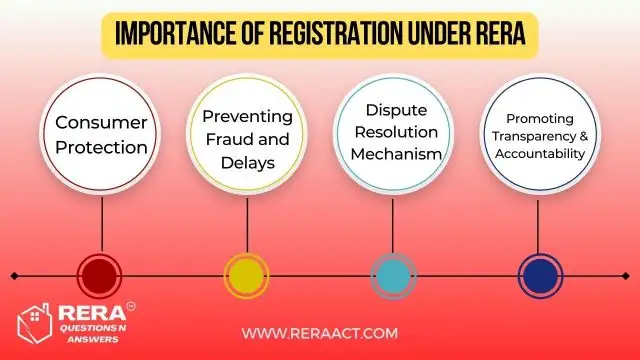The Real Estate (Regulation and Development) Act (RERA) 2016 is a landmark legislation in India that aims to bring transparency, accountability, and efficiency to the real estate sector.
One of the requirements under RERA is the mandatory registration of real estate projects.
In this article, I have provided a brief guide on the registration process and its significance under the RERA Act 2016.
Registration Requirement in the RERA Act
Under Section 3 of the RERA Act, developers must register their real estate projects with the appropriate State’s Real Estate Regulatory Authority (RERA).

This provision applies to residential and commercial projects, including plotted developments, group housing schemes, commercial complexes, etc.
The registration of real estate projects requirement applies to them exceeding the size or number of units specified under the RERA Act.
Read more about section 3 of the RERA Act here.
Crucial Steps in the Registration Process in the RERA Act

1. Developer Registration
The promoter or developer applies for the registration of real estate projects with the state’s RERA.
The application must include details- the project’s layout, plans, estimated project cost, approvals obtained, land title details, and other relevant documents.
The developer submits this application online or through the designated offline mode, accompanied by the prescribed fee.
Read more about RERA developer registration here.
2. Verification and Scrutiny
Upon receiving the application, the RERA authority verifies the provided information.
Then, it scrutinizes the documents to ensure compliance with the RERA Act’s provisions. It includes verifying the authenticity of project-related documents and assessing the developer’s track record.
Read more about the RERA scrutiny and verification process here.
3. Registration Certificate
A registration certificate is issued to the developer if the RERA authority is satisfied with the application and finds it compliant.
It signifies that the project has met the requirements under RERA and can proceed with marketing, selling, or advertising the units.
Read more about the RERA registration certificate here.
Importance of Registration under RERA

1. Homebuyer Protection
The primary objective of project registration under RERA is to safeguard the interests of homebuyers.
The registration process ensures that developers provide accurate information, maintain transparency, and fulfil their obligations towards the buyers.
It empowers consumers with essential information about the project, including details of the developer, project timeline, and amenities.
Read more about the Homebuyer Rights in RERA Act here.
2. Preventing Fraud and Delays
RERA’s registration requirement acts as a deterrent against fraudulent activities and unauthorized projects.
It helps to remove instances of developers misrepresenting facts, diverting funds, or delaying project completion.
The registration process encourages developers to adhere to timelines and deliver projects as promised.
Read more about the RERA project completion timelines here.
3. Dispute Resolution Mechanism
Registered projects provide everyone with the benefits of the dispute resolution mechanism provided under the RERA Act.
If any disputes or grievances arise between the developer and the buyer, RERA provides a platform for resolution, ensuring fair and timely redressal.
Read more about the RERA grievance redressal system here.
4. Promoting Transparency and Accountability
Registration under RERA promotes transparency and accountability in the real estate sector.
It establishes a framework for developers to provide accurate information and protects buyers from misleading marketing practices.
The Act also mandates periodic updates from developers to the regulatory authority and buyers, ensuring transparency throughout the project’s lifecycle.
Conclusion
The registration of real estate projects under the RERA Act 2016 plays a vital role in protecting the interests of homebuyers and promoting transparency in the real estate sector.
RERA’s registration requirement establishes a framework that benefits the developers and buyers by ensuring compliance, preventing fraud, and providing a robust dispute resolution mechanism.
Developers should understand and adhere to the registration process to maintain the integrity of the real estate market and foster trust among consumers.


